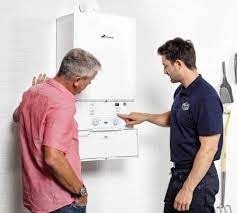Installing a new boiler is a significant investment for homeowners in Chicago, where a reliable heating system is essential during the long, cold winter months. Understanding what to expect during the installation process can make the experience smoother, reduce stress, and ensure your boiler operates efficiently and safely from day one.
At Chicago Comfort HVAC Services, we specialize in professional boiler installation and provide a step-by-step checklist so homeowners know what to expect.

1. Initial Assessment and Consultation
Before any installation begins, a professional technician will evaluate your home’s heating needs. This includes:
- Assessing Home Size: Determining the boiler output required to heat your home efficiently.
- Evaluating Existing System: Checking your current boiler, radiators, or underfloor heating system for compatibility.
- Discussing Preferences: Helping you choose the right type of boiler—combi, system, or conventional—and fuel type.
This assessment ensures your new boiler is properly sized and matched to your home’s unique requirements.
2. Selecting the Right Boiler
Choosing the right boiler is crucial for efficiency, comfort, and long-term reliability. During this stage, your technician will:
- Recommend models based on energy efficiency ratings and your heating needs
- Explain the pros and cons of different fuel options, such as natural gas, propane, oil, or electricity
- Review features like smart thermostats, condensing technology, and hot water output
Proper selection helps maximize savings, reduce energy waste, and ensure consistent comfort.
3. Preparing the Installation Area
Before the new boiler is installed, the installation area must be prepared. Homeowners should:
- Clear the space around the old boiler for removal
- Ensure access to plumbing, gas lines, and electrical connections
- Notify family members of temporary interruptions to heating or hot water
Professional technicians also inspect the area to ensure safety and compliance with building codes.
4. Removal of the Old Boiler
The next step involves safely disconnecting and removing the existing boiler. This includes:
- Shutting off the fuel supply, water, and power
- Disconnecting pipes, flues, and electrical connections
- Carefully removing the old unit from the installation area
Proper removal prevents damage to your home and prepares the space for the new system.
5. Installing the New Boiler
The installation process itself involves several key steps:
- Positioning the new boiler in the designated location
- Connecting water lines, gas supply, and electrical wiring
- Installing proper ventilation and flue systems
- Ensuring all components are secured and aligned correctly
Professional installation ensures that the system operates safely and efficiently, reducing the risk of future issues.
6. System Testing and Calibration
Once installed, the boiler must be thoroughly tested. Technicians will:
- Check water pressure and flow
- Balance radiators or underfloor heating systems
- Test hot water supply and heating performance
- Inspect safety controls, such as pressure relief valves and shutoffs
Calibration ensures that your boiler runs efficiently, providing consistent heat and reliable hot water throughout your home.
7. Homeowner Orientation
After installation, a professional will walk you through your new system, explaining:
- How to operate the thermostat and control settings
- Recommended maintenance routines and annual service schedules
- Safety precautions, including what to do in case of leaks or malfunctions
Understanding your boiler’s operation helps you maximize its lifespan and performance.
8. Scheduling Future Maintenance
A new boiler performs best with regular maintenance. Your technician will help you:
- Set up annual professional maintenance appointments
- Identify signs of potential issues before they become costly repairs
- Ensure that warranties remain valid through proper care
Regular maintenance keeps your system efficient, reliable, and safe for years to come.
Benefits of a Professional Boiler Installation
- Reliable Heating: Consistent warmth, even during the coldest Chicago winters
- Energy Efficiency: Lower utility bills with modern, high-efficiency boilers
- Enhanced Safety: Advanced safety features and proper installation reduce risks
- Long-Term Savings: Reduced repair costs and extended system lifespan
Trust Chicago Comfort HVAC Services for a Smooth Boiler Installation
At Chicago Comfort HVAC Services, our certified technicians guide homeowners through every step of the boiler installation process. From initial consultation to professional installation and system testing, we ensure a hassle-free experience and long-lasting performance.
📞 Call us today to schedule your boiler installation and enjoy a warm, efficient, and safe home all winter long.